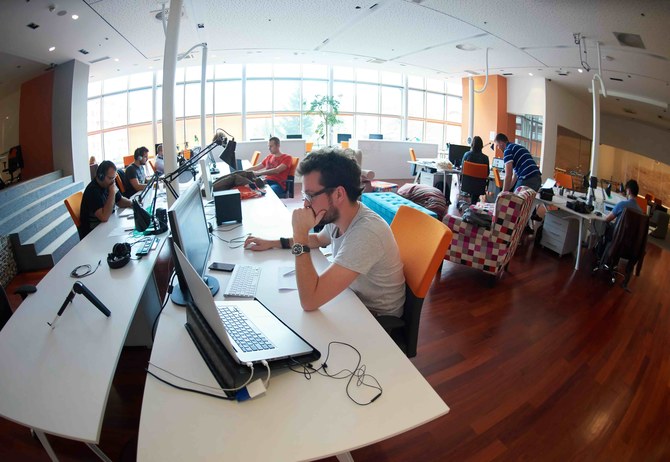
Funding across EVMs fell from $1.9 billion in the second quarter to $1.4 billion in the third quarter
MENA startups secured $1.3 billion across 352 deals, reflecting a relatively modest 6% drop in deal count
RIYADH: Startups in the Middle East and North Africa raised $1.3 billion in the first nine months of the year, reflecting a 13 percent year-on-year decline, the latest data showed.
MAGNiTT, a venture capital data platform for emerging venture markets, revealed this in its third-quarter report, analyzing investment trends across the Middle East, Africa, Southeast Asia, Pakistan, and Turkiye for the first nine months of 2024.
Despite the broader slowdown in global venture capital activity, the region showed resilience, outperforming other emerging venture markets, or EVMs.
MAGNiTT CEO Philip Bahoshy highlighted the region’s growing appeal to global investors, particularly for early-stage investments.
“MENA’s performance in the nine months of 2024 underlines the region’s increasing appeal to global investors, particularly at the early stages. The number of investors has grown by 34 percent year-on-year, driven by a 69 percent increase in international investors,” he said.
Bahoshy also said that the fourth quarter traditionally performs strongly, adding that events, like Expand North Star and the Future Investment Initiative Forum, are expected to further boost funding activity in MENA.
Investment snapshot
Overall, EVMs saw a significant downturn, raising $4.9 billion — a 45 percent year-on-year decline. Southeast Asia and Africa recorded the steepest drops, while the Middle East and North America experienced the smallest decrease, buoyed by two consecutive quarters of year-on-year funding growth.
The total deal count across EVMs was 974, a 29 percent decline year-on-year. Total investors saw a slight 4 percent decline to 1,250, while total exits dropped by 39 percent.
Singapore ranked as the top country in EVMs, with $1.64 billion in funding, 178 deals, and 15 exits. Fintech was the leading industry for investors, attracting $1.77 billion across 198 deals.
Alibaba Group was the most active investor in terms of funding, contributing $234 million, while Antler led in deal count with 60 transactions.
Funding across EVMs fell from $1.9 billion in the second quarter to $1.4 billion in the third quarter. Deal counts also declined from 296 to 281.
This quarter-on-quarter drop was primarily driven by the absence of Southeast Asia’s mega deals, which fell from $670 million to zero, causing a 54 percent decrease in funding for the region and significantly impacting the overall performance of EVMs.
MENA deep dive
MENA startups secured $1.3 billion across 352 deals, reflecting a relatively modest 6 percent drop in deal count compared to the same period last year.
Total investors in MENA increased by 34 percent, underscoring the region’s attractiveness among EVMs. However, there were only 17 exits during the first nine months, marking a 50 percent year-on-year decline.
Fintech remained the top sector in MENA, attracting $480 million across 72 deals. The Saudi Public Investment Fund’s Sanabil Investments was the most active investor in terms of funding, deploying $59 million, while Flat6Labs led in deal count with 37 transactions.
Among the MENA countries, the UAE, Saudi Arabia, and Egypt stood out for their growth in deal volume. The UAE accounted for 38 percent of all MENA deals, with a 12 percent rise in the number of transactions, largely fueled by a 40 percent increase in seed and pre-series A rounds.
Saudi Arabia followed with a 7 percent year-on-year increase in deal count, supported by a 46 percent jump in seed deals from companies such as Moyasar, SiFi, and Anabolic.
Egypt posted a 45 percent rise in seed and series A rounds, though it saw a 17 percent decline in pre-seed activity, indicating a shift toward more mature companies.
In terms of funding, Saudi Arabia ranked first, with $509 million deployed into startups, an 8 percent annual decline. The UAE followed with $380 million, an 18 percent decrease.
Africa and Southeast Asia
In contrast, Africa and Southeast Asia saw substantial contractions in venture capital activity.
African startups raised $839 million, a 38 percent year-on-year decline, with deal volumes falling by 42 percent to 202. This downturn was largely driven by an 81 percent reduction in accelerator investments.
Total investors in Africa decreased by 16 percent to 310, while total exits dropped by 36 percent to 14.
Fintech remained the top sector in Africa, attracting $557 million across 49 deals. Norrsken22 was the most active investor in terms of funding, with $54 million, while Renew Capital led in deal count with 15 transactions.
Egypt was Africa’s top-performing country, with $304 million in funding and 56 deals. The largest deal was Halan’s $157.5 million raise. South Africa led in exits.
Southeast Asia faced the steepest decline among all EVMs, with funding falling to $2.77 billion — a 51 percent year-on-year drop — primarily due to a significant decrease in deals exceeding $100 million.
Total deals in Southeast Asia amounted to 349, a 28 percent drop year-on-year. Total investors declined by 9 percent, while exits fell by 26 percent.
Africa’s funding rebounded strongly in the third quarter, with a 168 percent quarter-on-quarter increase, driven by a resurgence in series A and B deals, particularly among fintech startups, and Halan’s $157.5 million mega deal.
Southeast Asia experienced a 35 percent quarter-on-quarter decline in deal volume during the third quarter, while Africa’s deal count rose by 59 percent. South Africa, Nigeria, and Egypt more than doubled their deal volumes.
Looking ahead, Bahoshy said that the fourth quarter will be pivotal, particularly given global trends pointing toward lower interest rates and a potential uptick in investment activity.
“The fourth quarter of 2023 set a high benchmark with two mega deals in Saudi Arabia and the year’s highest quarterly funding in MENA. With global trends pointing toward lower interest rates and an uptick in investment activity, the fourth quarter of 2024 will be a crucial period. All eyes are on whether we can exceed last year’s performance,” he added.












